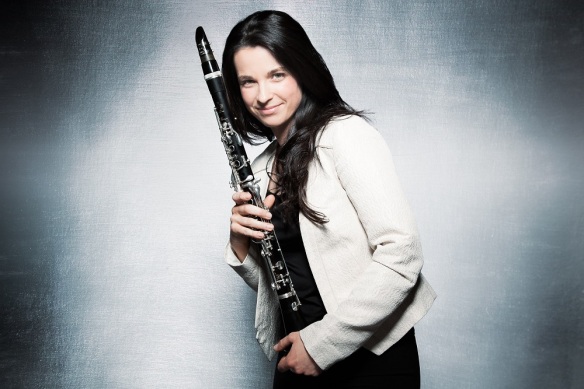 Annelien Van Wauwe (clarinet, above) and Nino Gvetadze (piano, below)
Annelien Van Wauwe (clarinet, above) and Nino Gvetadze (piano, below)
Debussy Première rapsodie (1909-10)
Poulenc Clarinet Sonata (1962)
Schumann Arabeske in C major, Op 18 (1838-9)
Brahms Clarinet Sonata in E flat, Op 120 No 2 (1894)
Wigmore Hall, London; Monday 20 March, 2017
Listen to the BBC broadcast here
Written by Ben Hogwood
The soft, languid tones of Annelien Van Wauwe’s clarinet were perfectly judged at the hushed start of Debussy’s Première rapsodie, the first piece in a nicely chosen set of music for clarinet and piano.
This piece is an elusive ten-minute train of thought, with two distinct ideas – the slow, sleepy opening paragraph (from 1:40 on the broadcast link) and another, spiky idea (around 3:42), begging for a jazz accompaniment. Gradually the two get closer together and the cumulative energy builds. Nino Gvetadze’s colourful piano accompaniment showed just how suitable the piece is for orchestra – which Debussy realised with a subsequent arrangement.
Poulenc’s Clarinet Sonata is one of his last published works, written in homage to fellow composer Arthur Honegger. Central to its success is the yearning theme of the central Romanza (16:36), where Van Wauwe’s tone and phrasing was beautifully observed. The first movement (beginning at 11:24) could have been a bit more mischievous, perhaps, but the brisk and largely upbeat finale (21:22) certainly hit the spot.
 Following this was a chance for Gvetadze to take centre stage in Schumann’s lilting Arabeske (25:40), where wife Clara explicitly asked him to avoid making musical references to her. I’m not convinced he kept that bargain, because the music is very affectionate, and Gvetadze portrayed that too.
Following this was a chance for Gvetadze to take centre stage in Schumann’s lilting Arabeske (25:40), where wife Clara explicitly asked him to avoid making musical references to her. I’m not convinced he kept that bargain, because the music is very affectionate, and Gvetadze portrayed that too.
We then heard Brahms’ last published chamber work, the last part of an Indian summer instigated by the clarinettist Richard Mühlfeld, whose quality of tone directly inspired four pieces from the composer. This included a pair of sonatas published in 1894 as Brahms’s Op.120. These are lovely autumnal works, and both performers shaded the E flat work, the more positive of the two, with appropriate care. More authority could perhaps have been given to the second movement (marked Allegro appassionato, from 43:26 on the broadcast) but the outer movements had plenty to admire. The first movement (from 35:09) was largely contented, while the last, a theme and variations (48:50), was more changeable in mood and brilliantly played here, Brahms’ inspiration as keen as ever.
A final thought – what will Brexit mean for the non-English contingent the BBC choose for their excellent New Generations scheme? One of many questions classical music and the arts will face in the coming months and years.
Further listening
Brahms’s last works for clarinet are collected in the playlist below. They are autumnal in nature but have some wonderful lyrical writing for the instrument.
